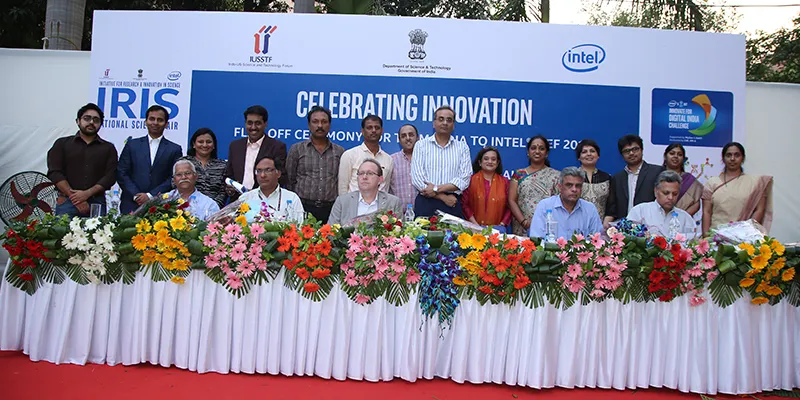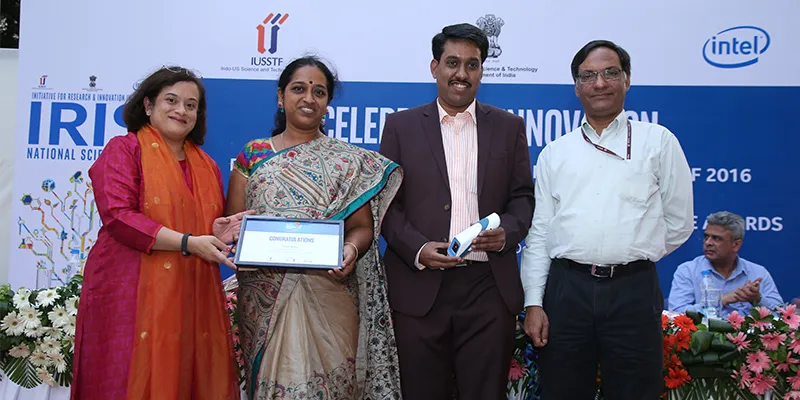Intel & DST Innovate for Digital India challenge to stimulate a culture of tech-led innovations
This post has been sponsored by Intel
A wearable product with relevant applications, TJay enables healthcare practitioners to monitor, diagnose, treat, and remotely track and support people with epilepsy. An interesting feature of this device developed by a team of three enterprising youngsters from Karnataka – Rajlakshmi Borthakur, Chayanika Baruah, Karthik C – is that it is capable of transmitting body signals with and without Internet connectivity and thereby plays a significant role in enabling better healthcare in rural India.
Asha+, a handheld remote health monitoring solution that aids early detection and enables effective intervention especially in medical emergencies is also hoping to enhance the healthcare experience in India. This Intel® Edison-based, low-cost, easy-to-use device, measures temperature, blood pressure and blood glucose. The device will enable millions of people to keep a check on various health parameters, right at their homes leading to better healthcare. The team from Tamil Nadu, comprising Sai Ram Mannar and Jayashree B G have shared this innovative idea.
Another pressing need of the hour is providing relevant tech access to farmers. Comprehensive information that helps them take timely decisions and thereby improve productivity and minimise crop loss, will be of great help. And, an Intel® Edison-based Agri-pole device has made this possible. Anand Babu, Sivaprakash L, Hareesh U, a trio from Karnataka have developed Jayalaxmi Agrotech – crop-specific apps in regional languages and English that assures higher knowledge about smart farming with a view to make agriculture in India a profitable business.
It is these three ideas that have made the cut among the 1,900+ entries that aimed to provide tech solutions as part of the Intel and Department of Science and Technology (DST) Innovate for Digital India Challenge (IFDIC)

Intel and DST Innovate for Digital India Challenge
The 11-month long challenge launched in April 2015, organised by Intel and DST, aimed to unearth talented young companies and entrepreneurs with the ability to develop intuitive solutions for the delivery of e-governance services through eKranti/MyGov apps on mobile platforms.
For the three winning teams, T Jay, Jayalaxmi Agrotech, and Asha+, which emerged victorious after a vigorous process, it was a huge moment of vindication for their efforts. The winning teams were among the top 10 teams shortlisted in November last year. The top 20 teams participated in the 12- week-long accelerator programme, aimed at facilitating design and development of commercially viable products. Each of these teams also got Rs 2 Lakh prototyping grant.
The programme saw the teams going through a steep learning curve, while dealing with the challenge of bursting some long-held beliefs and methods that had worked for them until then. Of the 20 teams, 10 were then shortlisted to showcase their solutions at the #Innovate4DigitalIndia event. While the teams that made it to the top 10 received a product development grant of Rs 5 lakh each, the three winning teams will now have access to equity investments of up to Rs 20,00,000 each.

Collaborating to make an impact on India’s digital growth
In an event held in New Delhi in April this year, the 10 short-listed teams along with the three winning teams were felicitated in the presence of Y. S. Chowdary, Hon'ble Minister of State, Science & Technology and Earth Sciences, Government of India; Professor Ashutosh Sharma, Secretary, Department of Science and Technology, Government of India; Debjani Ghosh, Vice President, Sales and Marketing Group and Managing Director, South Asia at Intel Technology India Pvt Ltd.; Michael Pelletier, Deputy Chief of Mission, Embassy of the United States of America; and Gaurav Dwivedi, CEO, mygov.in. The event was also attended by many key government representatives and leaders.
The leaders congratulated the students for winning the challenge. Y. S. Chowdary, said, “Successful collaborations between the government and the private sector through initiatives like these aptly support our vision. It is endearing to see young minds coming together to address local challenges through the power of technology.”
Commenting on the occasion, Debjani Ghosh, said, “Intel believes that innovation is indispensable for the Indian economy to realise its vision of becoming a successful digital economy. This shift necessitates a strong ecosystem that brings together students, entrepreneurs, and industry collaborations, and creating that ecosystem is Intel’s commitment to India.”
In addition to organising initiatives such as the Innovate for Digital India Challenge aimed at nurturing a culture of innovation in the country, Intel also provides broader support for the Digital India Initiatives. Engaging in multiple initiatives such as Intel India Maker Lab that provides infrastructure to budding entrepreneurs and platforms; Initiative for Research and Innovation in Science* (IRIS); Intel India Embedded Challenge, it hopes to stimulate a culture of innovation and technology enabled transformation in young Indians.







